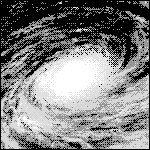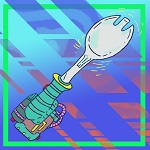|
Ah, he does talk quite at length about the relative and the absolute, and that much at least makes sense to me. We can know things, but everything we know is filtered through our imperfect senses, and so this knowledge will always be imperfect itself. This is why Shakyamuni said that even his teachings are not the true dharma? Even if the teachings themselves were absolute in his mind they would become relative truths as his words were interpreted by other people. So I should forget the contradiction, and stop trying to integrate two seemingly opposing ideas into a single truth. It wasn't at all clear to me that the text was describing a technique, so I am not at all sure what it is I am supposed to do. Try to simultaneously ignore and respect all things? As a type of contemplation or meditation? It seems a bit like nonsense but I'm happy to try as long as I understand the instructions well enough!
|
|
|
|

|
| # ? Jun 3, 2024 14:10 |
|
BIG FLUFFY DOG posted:Madhyamika refers to a Mahayana school of thought that was started by Nagarjuna. It heavily stresses the emptiness of all things which extends even to dharma the Buddha and emptiness itself.
|
|
|
|
eSporks posted:This seems like the heart of Taoism to me, and also highlights where I tend to fall off of Buddhism and other spiritual teaches. The focus on the dogma and ritual. Taoists were the first ones to translate Mahayana scriptures into Chinese 2000 years ago and the religions have not traditionally been considered incompatible in China so thereís been an incredible amount of cross contamination between the two.
|
|
|
|
I'm getting sick of being a Christian again. I do my best to follow the Bible(s), and I know some people have it way worse than me during these dark times. Though I'm NEVER happy, ever. Unless less I drink a 750ml of vodka in one night. I'm scared of Hell and letting God down. I've been reading some of Anton LaVey's books and though I don't agree with quite a bit of it, much of it makes sense to me. Like: " The controller of the universe is so impersonal, he doesn't really care about the happiness and sadness of us. " Anyway, do Buddhist believe in a God? Maybe, just maybe he's nicer than this Christian/Muslim one. Spacegrass fucked around with this message at 07:41 on Sep 26, 2021 |
|
|
Spacegrass posted:I'm getting sick of being a Christian again. I do my best to follow the Bible(s), and I know some people have it way worse than me during these dark times. Though I'm NEVER happy, ever. Unless less I drink a 750ml of vodka in one night. I'm scared of Hell and letting God down. I've been reading some of Anton LaVey's books and though I don't agree with quite a bit of it, much of it makes sense to me. Like: " The controller of the universe is so impersonal, he doesn't really care about the happiness and sadness of us. " The Buddhist understanding of the universe sort of rules out "God", in the sense that there is held to be no ultimate singular Creator, no Origin Point; everything is the result of dependent origination from previous causes. Things arise, things persist, things decay, things disappear. That's why there are things; and there were always things; and there will always be things. The details can and will vary. However, God is also somewhat irrelevant, because the purpose of the path is to liberate yourself from suffering through non-attachment, rather than to define and pursue a relationship with another entity. The various Buddhas and bodhisattvas are treated with reverence and appealed to, but it is not held that (for instance) Shakyamuni Buddha created the universe in which we live. To address some more specific theological nuances (since this is the leg of the path I tend to be following, as suits a goon  ): ): Buddhism does allow for powerful entities who could be compared to gods for pragmatic purposes. It is said that after he became enlightened, the Buddha had considered whether or not he should teach, and the god Brahma Sahampati beseeched him to teach the dharma. Generally, one reaches rebirth in these realms by accumulating great good karma, and life in these realms is long, comfortable, and free of pain - so wonderful that many such entities, even if they could use their super-powers to remember their previous states (in specific or in general), don't bother. The problem is that while this existence is long and comfortable, it is ultimately finite, and that after such a long, wonderful lifetime... you've exhausted your good karma. The various hell realms and poor rebirths are not presented as things which were created to punish people, or which are levied for violation of law in the sense of rules which were created or instituted. The "law" in this case is more like the "law of gravity," in other words it is a linguistic description (certainly incomplete, and possibly somewhat inaccurate on a fundamental level) of spiritual realities. The bodhisattvas and originally Shakyamuni wanted to help you but there is no penalty, generally speaking, if you do not seek out that help. You just don't get the benefit.
|
|
|
|
|
Nessus posted:I hope you're able to find some peace and calmness, especially if you have been driven to heavy drinking lately. Thanks, that makes sense...sort of. But if the lower realms are true, wouldn't there be people talking about how they use to be a God or a cockroach, or a lovely cat, or a dog with lots of personalities? Unless you can't remember this stuff. This is why I'm usually on the Christian/Muslim side because they believe once you die you remember your past lives. Ahhh it's all a mind F***. Is there a way to get out of the Hell realms? I've made so many mistakes in my life; but I think generally I'm a good person. I also know something (I hope not a demon) is giving me signs about a creator. We had an in ground hurricane (which I dreamed before it happend) IN Iowa....f..ing Iowa. I guess after all this thinking I'm staying a Christian, this Buddhism is messing with me. Thanks for your thoughts though! Spacegrass fucked around with this message at 12:05 on Sep 26, 2021 |
|
|
|
Spacegrass posted:Is there a way to get out of the Hell realms? I've made so many mistakes in my life; but I think generally I'm a good person. I think the belief is that you will eventually exhaust your bad karma. At that point you may be reborn into a less miserable existence. I think there may be a more detailed explanation from someone with more understanding a few pages back.
|
|
|
|
Spacegrass posted:Thanks, that makes sense...sort of. But if the lower realms are true, wouldn't there be people talking about how they use to be a God or a cockroach, or a lovely cat, or a dog with lots of personalities? remembering past lifes is accessible only after intense spiritual training. Hell is only temporary in buddhism and there are methods to shorten existence. The mahayana path requires you to care deeply about where everyone goes after they die not just you. Good person/bad person is not a real thing and a concept that will completely gently caress you up. All things are empty and devoid of inherent qualities. All people have done both good and bad things and possess both good and bad karma. The love of the buddha is equal for the good and the wicked. He is generous like a rain cloud which gives rain for no other reason than that the rain cloud is there. Are you in therapy? You're posting seems like you're in the middle of a crisis and those kinds of posts happen with some regularity between here and the religion thread. You have enough posts of a different more well-thought out style that I don't think its just your natural posting style. And the reference to drinking an entire bottle of hard liquor at once and never being happy is a big red flag. Religion is all well and good but it seems like you're having difficulty with the trauma of prison and guilt for the crimes that got you in prison (I believe you've mentioned this before). You need a personalized relationship with an expert who can help guide you through this.
|
|
|
|
Buddhist hells tend to be places for people who are deliberately evil in particularly nasty ways. The mundane "sins" that most people are involved in just land you in a rebirth as an animal or "hungry ghost". With Buddhisms emphasis on craving, hungry ghosts tend to be in situations like being thirsty all the time, but every drink is salt water. And for animals, there is story of a monk who was really attached to his robes who got reborn as a louse infesting those very robes.
|
|
|
|
spacegrass if you believe that you are prophesying please speak to a mental health professional
|
|
|
TehSaurus posted:I think the belief is that you will eventually exhaust your bad karma. At that point you may be reborn into a less miserable existence. I think there may be a more detailed explanation from someone with more understanding a few pages back.
|
|
|
|
|
TehSaurus posted:Ah, he does talk quite at length about the relative and the absolute, and that much at least makes sense to me. We can know things, but everything we know is filtered through our imperfect senses, and so this knowledge will always be imperfect itself. This is why Shakyamuni said that even his teachings are not the true dharma? Even if the teachings themselves were absolute in his mind they would become relative truths as his words were interpreted by other people. quote:It is recommended to respect all religions, but at the same time to ignore them! We should ignore all religions with respect. That's Madhyamika. [...]When I say religion, it doesn't need to be recognized or understood as a religion like Islam, Hinduism or Buddhism. I'm not necessarily talking about these. When I talk about religion, I mean a broad way of seeing religion as anything and everything you do. "Respect anything and everything you do, but at the same time ignore them. We should ignore anything and everything with respect." What this means is not to cling to anything, but not to be averse to anything either. When Buddha taught about the Middle Way, that's what he was talking about. You don't want to give up all worldly possessions and starve to death naked in a cave, thinking that somehow is a form of enlightenment--because it's not. But you also don't want to try to amass riches and step on people to climb to the top, etc. because that's also obviously just material and worldly pleasure. In this example, the starving naked man isn't able to respect the preciousness of existence, and the greedy powerhungry man isn't able to ignore the plethora of material pleasures calling for him. There's a Zen Buddhist idea. "Before enlightenment, chop wood and carry water. After enlightenment, chop wood and carry water." What it basically means is that you should be cultivating a mindset, or a practice, of daily living. For example, imagine someone new to Buddhism who thinks enlightenment sounds totally rad. They truly want to be a good person and free their mind. They decide to meditate for five hours in one sitting. They do it and think "I did it! I meditated so much, I was in such a deep meditation. I must be closer to being a Buddha now! That is awesome. .............Now what? Why can't I levitate yet?" That's a kind of misguided approach. Meditation is good, and an especially deep meditation can bring you a lot of insight and peace. But if you're meditating because you think Buddha is going to give you some kind of sticker and a good grade for your efforts, you're misguided. You want to respect the virtue of meditation but not get hung up on it. The chop wood, carry water ethos would translate into "I meditate because it's good for me. Will it bring me enlightenment? Haha.... Who knows? But I'll meditate again tomorrow." The quote is saying that you should treat everything like that.
|
|
|
|
if absolutely nothing else, sitting for 20 minutes is 20 minutes where you are probably doing zero harm, which is a very good startTehSaurus posted:Ah, he does talk quite at length about the relative and the absolute, and that much at least makes sense to me. We can know things, but everything we know is filtered through our imperfect senses, and so this knowledge will always be imperfect itself. This is why Shakyamuni said that even his teachings are not the true dharma? Even if the teachings themselves were absolute in his mind they would become relative truths as his words were interpreted by other people. I think it's one of those truisms about buddhism, but it often gets emphasized that buddhism has an understanding of contradictions that is very different from (in particular) anglo and christian approaches to contradictions, where they are bad and must be forcibly resolved and one side declared the winner and so on. It's a pretty common point of friction. Generally in Buddhism contradictions are presented as interesting things to be pondered and examined, and imo I share the perspective that they're often the specific things that add the most depth and complexity to the world. At their core contradictions are usually just the superficial appearance of a deeper and more nuanced relationship between things. Idk the perfect approach, but yeah they definitely aren't something to be forcibly resolved, they're just kind of a part of it all. And yeah there's a lot of seemingly contradictory stuff in buddhism: all phenomena are empty!, good and bad is an artificial duality!, and yet your choices and actions still very much matter, exceptionally so even. Traditionally schools/branches of buddhism generally have navigated this by carefully ordering what people learn about and when. Eg first you grow up hearing jataka tales, then you learn about living by the precepts and practicing non-harm and not engaging in misconduct and not spending all day every day all hosed up. Then in a practice context, people would be involved in a sangha at this point and would be learning and experiencing that there are indeed consequences to actions when you exist in a community. Only then after they're grounded in all that would someone get around to teaching them the stuff about emptiness or w/e other less-public teachings. Which makes sense, cuz there was, a big risk that people would just wildly misinterpret it as 'there are no bad things, do whatever.' That ordering ofc has largely broken down now that people can just youtube or google search drat near any concept or traditionally not-public teaching and find a significant body of explanation and discussion on it. (there's a whole rant here about people fetishizing 'high' and 'secret' teachings, but I'll skip it) Basically yeah there are a lot of contradictions, dig into them if they're interesting. Many of them are also just the byproducts of the relatively unstructured way people often learn about buddhism. Still, buddhism often just delights in contradictions and hopefully you can live with them lol Herstory Begins Now fucked around with this message at 20:55 on Sep 26, 2021 |
|
|
|
BIG FLUFFY DOG posted:
I see a shrink because I have schizophrenia (which I believe is from trauma, or in a lesser chance; Bad Karma.) I am actually thinking about getting therapy, but I'd have to do it online because I don't drive and I HATE the bus. I've seen a commercial for therapy online, and am seriously thinking about doing it.
|
|
|
|
BIG FLUFFY DOG posted:
So you're saying the Buddha is sort of like Jesus?
|
|
|
|
there's literally over a thousand years of indian buddhist philosophy that uses what's also called aristotelian view of contradiction. i doubt this is unique to the indian tradition
|
|
|
|
Buddha is closer to Jesus than to God the Father, yes. Buddha is not a creator-god. He was a sage who taught others a way to live in the world peacefully and graciously. The key difference between them, as far as I understand it, is that faith in Jesus is crucial for salvation in most Christian traditions. Which is to say that in Christianity, your soul is saved because you are able to have faith that Jesus's sacrifice made good the covenant and opened the gates of heaven for you. So faith in the power of the crucifixion is of utmost importance. Buddha, on the other hand, encourages a level of doubt in his followers. Depending on the school of Buddhist thought, this doubt can be emphasized or de-emphasized. On a straightforward level, what Buddha emphasized was the idea that his teachings make sense, and that you can test them out for yourself and see, and you don't have to blindly take his word for it. He did say that having faith was important, in the sense that if you are crippled by doubt, then you will not be able to live as effectively as you would if you had a clear sense of reality and right & wrong. But different schools emphasize that differently. Zen emphasizes the importance of having doubt (Great Doubt, even), which is to say that it takes a true re-shifting of your worldview to escape the cycle of rebirth. On the other hand, Pure Land Buddhism is very similar to faith-alone Christianity. Because we can take faith in Buddha's goodwill toward all beings, all we need to do is say "I take refuge in Buddha" and Buddha will take care of us, and will guide us to a rebirth that leads to enlightenment. In Mahayana Buddhism there are multiple Buddhas (we can all become a Buddha after all), and you can ask them for help because of their supreme goodwill. Amida Buddha (aka Amitabha) is known as the Buddha of Infinite Light. There is a belief system that you can simply pray homage to Amida Buddha and he will reserve a spot for you in his Pure Land, so that when you die and are reborn, you can be born into a land with perfect conditions for Buddha to teach you and lead you to enlightenment. This is the closest that Buddhism gets to the idea of a god and heaven, but the distinction is that Amida is not the creator of existence; he is a being who achieved Buddhahood and vowed to save others. The idea of Pure Land Buddhism is that, no matter how difficult your life may be and how hard it might be to become wise like Buddha, almost everyone is able to say "I take refuge in Amida Buddha." And Amida Buddha vowed to take anyone who called upon him to his pure land and teach them the dharma. So in a way it's very similar to faith-alone Christianity. In Catholicism, both faith and actions are required for entry into heaven. Pure Land Buddhism is closer to faith-alone Christianity in that it believes that Amida Buddha, much like Christ, is so supremely benevolent and caring, that all you have to do is accept his refuge and you can take heart that you will be protected. In a way, it's a permission slip to not have to worry about not being good enough--because there is no "not good enough" for someone who loves you so much and is so compassionate toward you.
|
|
|
|
If anyone is as interested as I am in the Pali Canon, Bhikku Bodhi's new (to me at least, it's from 2017) translation of the Suttanipata is great. It pretty much opens with the Rhinoceros Sutra after the commentary and goes on from there. It's quite good.
|
|
|
|
Cephas posted:Buddha is closer to Jesus than to God the Father, yes. Buddha is not a creator-god. He was a sage who taught others a way to live in the world peacefully and graciously. The key difference between them, as far as I understand it, is that faith in Jesus is crucial for salvation in most Christian traditions. Which is to say that in Christianity, your soul is saved because you are able to have faith that Jesus's sacrifice made good the covenant and opened the gates of heaven for you. So faith in the power of the crucifixion is of utmost importance.
|
|
|
|
I'm sorry, friend. I wish I could say. I agree with others that therapy is a good idea--it can give you someone to talk to about these and other things that are weighing on you, even if it's an online therapy service. I would recommend maybe sitting and gently inquiring to yourself, what do you mean when you say you've felt the Father? What are the qualities of that experience like? What do you think it would be like to experience Jesus, by comparison? It is a core belief of most sects of Christianity that God is a trinity, and that the Father and Jesus are inseparably the same being. If that's the case, then what are the Jesus-like elements of the Father that you feel you have experienced, since they must be there if they are the same being? This is my meager attempt at applying the Buddhist tenet of interdependence to a deep core belief of another religion, so I am not sure how compatible the thinking is.
|
|
|
|
Cephas posted:I'm sorry, friend. I wish I could say. I agree with others that therapy is a good idea--it can give you someone to talk to about these and other things that are weighing on you, even if it's an online therapy service. I would recommend maybe sitting and gently inquiring to yourself, what do you mean when you say you've felt the Father? What are the qualities of that experience like? What do you think it would be like to experience Jesus, by comparison? It is a core belief of most sects of Christianity that God is a trinity, and that the Father and Jesus are inseparably the same being. If that's the case, then what are the Jesus-like elements of the Father that you feel you have experienced, since they must be there if they are the same being? This is my meager attempt at applying the Buddhist tenet of interdependence to a deep core belief of another religion, so I am not sure how compatible the thinking is. I do not believe God and Jesus are the same person. I believe in a Heavenly Father and Heavenly Mother who created Jesus. (if I should move this to the Religion room let me know, in fact I better.) Thanks for your advice Buddhist goons.
|
|
|
|
BIG FLUFFY DOG posted:There is no part of you which is consistent. There is no self. All things are impermanent and constantly changing. You have hit upon the reason the illusion of a permanent self is created: memory. Through continuity of experience we gloss over the differences in emotion, will, perception, thought and body that occur from moment to moment which would mark us as being different beings. I agree, when I say consitent I don't mean utterly consistent but generally. I like heavy metal today and I will tomorrow. that kind of thing. Memory.. is a tenuous term in this regard. Maybe I'm being pedantic, but I'd say my memory is something like the library in my mind I can access. But a lot of who I am isn't the memory but simply the functionality. A good tennis player doesn't "remember" how to play tennis, their brain is extremely hard wired to perform those tasks. So them being more or less consistent day to day with regards to playing tennis isn't just memory. The way our minds work at all, is based on a life time of experience, and the way we act is a result of this. We don't just 'remember' how to be more or less consistent, it just is the way things are. quote:What we call ďselfĒ is the product of five aggregates or skandhas, these are emotion, will, body, thought, and perception. Like sticks resting against themselves or two playing cards supporting each other they all support each other. They are empty which is to say that their characteristics are derived from and ďsupportedĒ by the other four aggregates and the world at large. I suppose the rest of this comes down to something like a belief. Saying anything about how the five skandhas manifest in a new life, is a belief. By definition there can't be any evidence of it. It's interesting however. Anyway. Something different. I don't know where else to talk about this. But I was wondering about non-dual experiences. I have still not being able to discover it or whatever terminology is most correct, and so when I think about it on an intellectual level, it's not from a position of experience. Regardless, as it seems to me, it seems possible to reorientate the lived experience to be somewhere between the raw contents of consciousness and the judgement the mind places upon it. If this is something like what is happening, well, it makes me wonder, if it is like the judgemental part of the mind has been turned off, or if it's still there, just, out of view or something? I've almost given up looking for it tbh. I am still not even sure if it's found, what benefit it brings. echinopsis fucked around with this message at 10:16 on Oct 4, 2021 |
|
|
|
Outside of here, does anyone recommend any Buddhist communities online? Edit: I mainly ask because the Buddhist community in the city I'm at is fairly small, and I wanted to be able to talk to people about Buddhism outside of this small thread. Y'all are great, but I'd not call this a sangha. Hiro Protagonist fucked around with this message at 13:56 on Oct 4, 2021 |
|
|
|
Hiro Protagonist posted:Outside of here, does anyone recommend any Buddhist communities online? I used to lurk around Dharma Wheel, but Iím not sure how active it is these days.
|
|
|
|
Hiro Protagonist posted:Outside of here, does anyone recommend any Buddhist communities online? It might depend on what sort of community and what you mean by online. For Soto Zen, Iíve known people from ZMM and Sanshinji, and they were / are great people and had great things to say about those communities. I donít know anyone from ADZG in Chicago, but I regularly listen to their podcast, which includes discussion after dharma talks, and it seems like a good group, to add to which their teacher is in my view one of the most outstanding in the country. All three of those have online practice. Iím also a fan of SFZC, which has many excellent teachers, and has online practice and programs, but I donít know anyone who was a part of their community. A friend tried one of their programs and had good things to say about it. For a somewhat less traditional space, thereís also Angel City Zen. An acquaintance of mine likes it there, and it has online sits. Finally, Iíll mention Treeleaf Zen. Jundo Cohen, who in my view is another excellent teacher, set it up as a specifically online community. It offers everything: practice, forums, even jukai. But while Iím familiar with Jundo, Iím not familiar with the community, and I donít have a sense of whether the forums are a good place to be.
|
|
|
|
^ As an aside, at least one person who is (was?) quite seriously involved with ADZG posts here. ADZG is from sfzc lineage, albeit leighton has been around quite a variety of traditions and is an extremely skilled translator and I wouldn't be surprised if you bumped into more than just the suzuki lineage there. Also on the subject of San Francisco Zen center: SFZC people I have enjoyed my interactions with. I knew one of leighton's dharma brothers pretty well and got to talk to a few of their higher up people at fairly considerable lengths about the efforts they took in the aftermath of the dick baker scandal and idk it clearly was a huge wakeup call for them and it seemed to have shaken loose a bunch of the more blind idealism they had, if that makes sense. That was reassuring to hear given the potential for abuse in religious communities and I'd feel pretty comfortable recommending them to people. From what I've seen of them over the last decade, they appear to be on a good course and I think do a pretty good job of trying to translate zen into something that 'works' in an american context, but that still retains the original flavor. The main SF community seemed fully formal in their practice, but other of their communities do fairly stripped down services without all the bells and whistles, albeit they're still very formal as shikantaza pretty much invariably is. [disclaimer that I've sat with them a fair amount so I'm not unbiased, but I also wouldn't really describe myself as part of their community]. As to online buddhist communities: forums are very hit or miss, and imo very often with much more miss than hit. That's not to say they're all bad, I'd just take them with a big grain of salt and a fair amount of caution. In person communities have a big advantage in that it is generally easier to vet who you are talking to and that they will generally steer you towards people with a generally good understanding and some skill at communicating it. Sangha's that have moved online because of the pandemic are almost definitely the best bet compared to hanging out on forums or buddhism reddits or w/e, albeit if it works for you, then hey it works for you. To some extent anonymity, I think, does not work well with fairly serious efforts to practice or teach or communicate just because there are many things where you do need to know that the person talking about something is indeed qualified to be talking about it. On the oral and textual end of traditions there's a whole structure to how stuff is passed down where typically it will be introduced as specifically in the context of the precise lineage it proceeds from (and very often with some historical details of how, who, where and why it has been passed down) and I think having confidence in the identity is actually quite significant and probably just flat out is not compatible with anonymous message boards. That's not to say they're worthless or anything, just limited in their usefulness? Herstory Begins Now fucked around with this message at 12:21 on Oct 10, 2021 |
|
|
|
Yeah, Reddits and such do seem to be filled with a lot more people trying to prove that their view of Buddhism is the correct one rather than focusing on open communication. This thread has been very good for more of the latter!
|
|
|
|
Nude Hoxha Cameo posted:
I can vouch for treeleaf. I have been a member since 2014 and while I am bad about regularly checking in I appreciate that sitting zazen is encouraged over posting on the forums. I find it to be a helpful community. I think I've only ever posted once though. It just hit me that I've been on treeleaf for 7 years. I've been sitting zazen since 2003. I think I posted earlier that I'm uncomfortable with the buddhist label but as of right now I've been at it for more than half of my life. Weird edit: Correction, that should be *almost* half my life. I'm not good at math Greg Legg fucked around with this message at 02:28 on Oct 11, 2021 |
|
|
|
Before enlightenment, post. After enlightenment, post.
|
|
|
|
|
The boddhisatva re-regs in spite of the suffering involved, that all posters may be enlightened
|
|
|
|
i am not trolling but merely posting as a wisdom king, that my wrathful compassion will chase you to enlightenment.
|
|
|
Hiro Protagonist posted:Outside of here, does anyone recommend any Buddhist communities online? I would be very dubious of goon endowments and empowerments, however.
|
|
|
|
|
Just went to Engyo Temple this week and was wondering if the quantity of arms had any significance beyond being used for identification.   
|
|
|
|
the more arms you have the more snacks you can eat at once. little debbie is a bodhisattva idk why theyre not limited by number of mouths, maybe thats part of enlightenment gate gate paragate parasamgate bodhi starcrunch
|
|
|
|
im moving next month and it turns out the new place is less than two miles from a local buddhist center for the first time in my life i might have an actual sangha. im so excited
|
|
|
Achmed Jones posted:im moving next month and it turns out the new place is less than two miles from a local buddhist center 
|
|
|
|
|
Herstory Begins Now posted:^ As an aside, at least one person who is (was?) quite seriously involved with ADZG posts here. ADZG is from sfzc lineage, albeit leighton has been around quite a variety of traditions and is an extremely skilled translator and I wouldn't be surprised if you bumped into more than just the suzuki lineage there. It's been a while, but many thanks for posting these observations. SFZC is a way more formal practice environment than our sangha (different, though related, Soto lineage), but I've always wanted to practice there, and if the pandemic ever ends, I will. They've always seemed to have their priorities straight, and absolutely they have some very talented teachers. In the meantime, our sangha remains in touch, but not physically together for sits, so likely I, too, will be in the market for a digital sangha. Probably ADZG in my case.
|
|
|
|
I've been reading from the Pali Canon at work during slow times as my mental state hasn't been great and it's been a huge help. I've definitely been more inclined towards more skillful activities and mental states. There's some decent laughs in there too, like when the Buddha tells Kesi the horse trainer that he kills people as a bit (does not regard them in any way if they are truly unteachable in their present conditions). The last time I dove into Buddhist material it was Mahayana focused, mostly Tiantai/Tendai, some Zen, and despite the millennia or two difference in date of authorship there's some uncanny similarities. Stream-entry is described in a pretty similar way to kenshō despite a pretty big divergence in approach and culture between Theravada and say Hakuin's flavor of Rinzai. My local Dharma center is non-sectarian and does some great things like classes in the local prisons with interested incarcerated people (on hold due to covid restrictions in the prisons) and I think I might start participating in some of their activities. I only looked it up after reading this thread, so thank you. edit: if you are a person with a broadly secular mindset, but might be interested in explicitly Buddhist practice (rather than "mindfulness") as at least a practical philosophy, the youtube channel Doug's Dharma https://www.youtube.com/c/DougsDharma/videos has a lot of good material corn haver fucked around with this message at 00:45 on Dec 14, 2021 |
|
|
|
I'm not a Buddhist but I read a Buddhist story as retold by Tolstoy years ago, and then when I went back to reference it, I found I remembered it wrong. The story is the one about the man who is chased by a beast/tiger off of a cliff, where he hangs by a vine, then sees three dragons underneath him at the base of the cliff, and two mice gnawing away at the vine. As he hangs, facing inevitable death, he sees that a flower on the vine has nectar flowing from it, and savors it. Hopefully that's a familiar enough story to be known by the description because I don't think he gave any other information relating to it. This is portrayed as foolishness, but I'm confused by it. There's no way out in this parable, the man is going to die very soon. Finding what joy there is to find in the face of oblivion seems like the most reasonable action, what am I missing? I understand that Buddhism has an idea of escaping the recurring suffering of reincarnation, did the original story give the man the option of doing ??? to escape the cycle?
|
|
|
|

|
| # ? Jun 3, 2024 14:10 |
|
i've heard that story as well (with a strawberry instead of nectar); i heard it as a kid in martial arts classes. the takeaway was basically living mindfully and enjoying the strawberry without letting the inevitable destruction ruin it (nb parallel with aging, general worries, etc) idk what tolstoy was on about but id recommend reading tolstoy as telling his own stories for his own reasons than as an authorarive interpreter of buddhist parables. i just looked it up and the interpretation i give seems to he the standard one
|
|
|





























